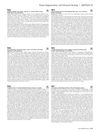SHISA6 Confers Resistance to Differentiation-Promoting Wnt/β-Catenin Signaling in Mouse Spermatogenic Stem Cells
February 2017
in “
Stem Cell Reports
”

TLDR SHISA6 helps maintain certain stem cells in mouse testes by blocking signals that would otherwise cause them to differentiate.
In the 2017 study by Tokue et al., the role of SHISA6 in mouse spermatogenic stem cells was examined, particularly its interaction with Wnt/β-catenin signaling, which typically promotes cell differentiation. The researchers discovered that SHISA6 is expressed in a subset of GFRα1-positive spermatogonia and acts as a cell-autonomous inhibitor of Wnt/β-catenin signaling, thereby conferring resistance to differentiation. This was evidenced by the finding that mice with stabilized β-catenin had smaller testes and fewer GFRα1+ cells, indicating that a higher Wnt/β-catenin signal leads to a reduction in these cells. Functional assays further confirmed SHISA6's inhibitory role. The study also showed that SHISA6 expression is linked to T (Brachyury)-positive cells, which are associated with stem cell characteristics. The results suggest that SHISA6 contributes to the maintenance of the GFRα1+ cell pool by providing resistance to differentiation signals, which could be a general mechanism of stem cell regulation applicable to other systems beyond spermatogenesis.

